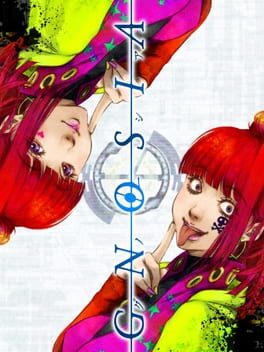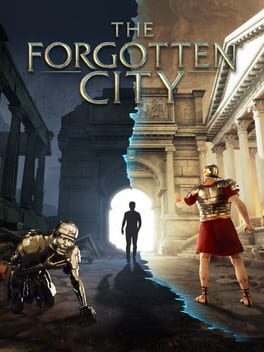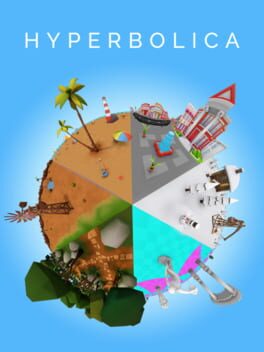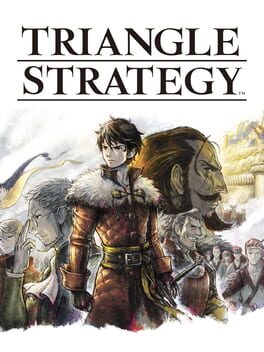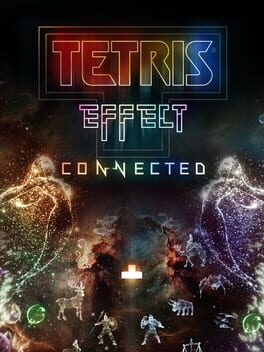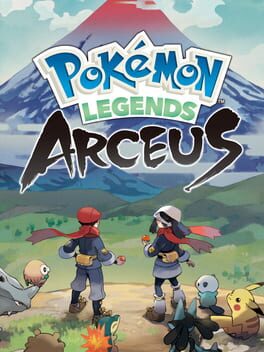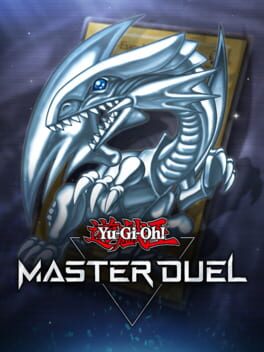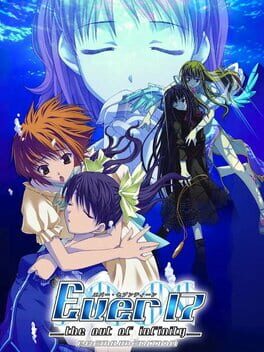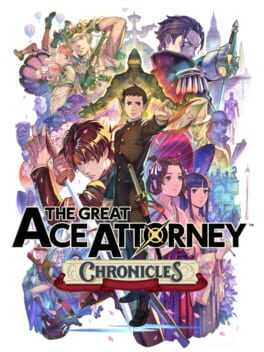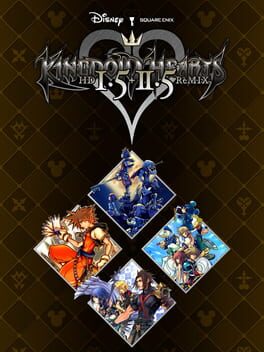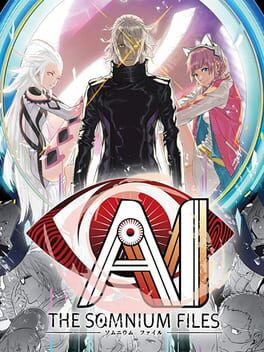LunaFlare
2019
Couldn't get into this at all. It's a hidden role game, but the opponents aren't human enough for you to tell if they're lying, so you're just blindly guessing. The plot that's supposed to develop between rounds did so way too slowly, with most attempts to trigger an event just being met with "go away, I hate you".
2021
2022
2022
This review contains spoilers
This game gradually grew on me more and more as I played it and I loved it by the end, though I think giving each ending a full play-through was a bit too much. I have a lot of thoughts about this game, so here goes nothing.
The tactical gameplay is pretty nice, genre standard as a successor to FFT and Tactics Ogre. The added nuances with things like weather and terrain effects are neat, and a positive on the game, but ultimately a pretty small detail. Compared to the character customisation of FFT, I think I prefer this system with its more preset character archetypes, so that I can just get on with the game instead of spending years planning out my build.
The conviction system is implemented really well. The way the game presents three choices, aligned with "Liberty", "Morality" and "Utility", but doesn't tell you which is which so that you actually pick with your heart and don't just decide to do "a liberty run", is fantastic, especially because a decent spread of convictions is important for unlocking characters. And then, on NG+, the game turns around and makes this system completely transparent, telling you what the choices do and how to unlock characters, so that you can efficiently experience all the content. They don't have to obscure the effects of the system in the hopes that players think more is affected by it than is true.
The plot amusingly starts off much the same as the average Fire Emblem game, but that's only a stepping stone to a much more nuanced and interesting plot with a variety of different resolutions. Much is made of the wordiness and length of the game's cutscenes, but as a Visual Novel fan I hardly mind. That comparison reflects on the narrative design too, with story branches represented by a flowchart. The decision to have a Golden Ending may be a contentious one, but given the how the other three endings go, I'm ultimately glad for it.
One issue I do have is how several decisions boil down to "do the right thing, but do we have the strength to see it through?" and "we don't have the strength, we have to submit to a poor outcome". The fact the "hard" option is presented as a valid choice means you know it has beatable gameplay behind it, undermining the uncertainty. This works better when it's framed as a sacrifice and not a challenge. This suggestion isn't compatible with the conviction system, but maybe more chapters that worked like the trial in Hyzante, where the route splits based on whether you complete a challenge, would have been more appropriate for these moments.
The exploration and persuasion sections are both enjoyable changes of pace from fights, though they do further extend the wait between battles if that's all you're here for. Personally I wasn't, so I loved them.
Absent the Golden Ending, which you're not intended to know about going in, the final route split is a legitimately difficult decision, at least it was for me. After I decided that I favoured the Roselle over Norzelia though, Frederica's ending was very much to my taste, especially the dash of found family in Serenoa's last speech, so in retrospect it's easily my favourite of the three and the choice is no longer hard.
The level scaling on NG+ is a mixed bag. On one hand, it's probably good that the game tries to still engage you on repeat playthroughs. On the other, by the third and fourth I really just wanted to blast through and get to the new decision points. A flowchart you could jump through would have been a good compromise, perhaps? Would lead to a strange structure though.
Music in this game is pretty good, with a couple of absolutely standout tracks, but something about them means most of it hasn't stuck in my mind long term.
The tactical gameplay is pretty nice, genre standard as a successor to FFT and Tactics Ogre. The added nuances with things like weather and terrain effects are neat, and a positive on the game, but ultimately a pretty small detail. Compared to the character customisation of FFT, I think I prefer this system with its more preset character archetypes, so that I can just get on with the game instead of spending years planning out my build.
The conviction system is implemented really well. The way the game presents three choices, aligned with "Liberty", "Morality" and "Utility", but doesn't tell you which is which so that you actually pick with your heart and don't just decide to do "a liberty run", is fantastic, especially because a decent spread of convictions is important for unlocking characters. And then, on NG+, the game turns around and makes this system completely transparent, telling you what the choices do and how to unlock characters, so that you can efficiently experience all the content. They don't have to obscure the effects of the system in the hopes that players think more is affected by it than is true.
The plot amusingly starts off much the same as the average Fire Emblem game, but that's only a stepping stone to a much more nuanced and interesting plot with a variety of different resolutions. Much is made of the wordiness and length of the game's cutscenes, but as a Visual Novel fan I hardly mind. That comparison reflects on the narrative design too, with story branches represented by a flowchart. The decision to have a Golden Ending may be a contentious one, but given the how the other three endings go, I'm ultimately glad for it.
One issue I do have is how several decisions boil down to "do the right thing, but do we have the strength to see it through?" and "we don't have the strength, we have to submit to a poor outcome". The fact the "hard" option is presented as a valid choice means you know it has beatable gameplay behind it, undermining the uncertainty. This works better when it's framed as a sacrifice and not a challenge. This suggestion isn't compatible with the conviction system, but maybe more chapters that worked like the trial in Hyzante, where the route splits based on whether you complete a challenge, would have been more appropriate for these moments.
The exploration and persuasion sections are both enjoyable changes of pace from fights, though they do further extend the wait between battles if that's all you're here for. Personally I wasn't, so I loved them.
Absent the Golden Ending, which you're not intended to know about going in, the final route split is a legitimately difficult decision, at least it was for me. After I decided that I favoured the Roselle over Norzelia though, Frederica's ending was very much to my taste, especially the dash of found family in Serenoa's last speech, so in retrospect it's easily my favourite of the three and the choice is no longer hard.
The level scaling on NG+ is a mixed bag. On one hand, it's probably good that the game tries to still engage you on repeat playthroughs. On the other, by the third and fourth I really just wanted to blast through and get to the new decision points. A flowchart you could jump through would have been a good compromise, perhaps? Would lead to a strange structure though.
Music in this game is pretty good, with a couple of absolutely standout tracks, but something about them means most of it hasn't stuck in my mind long term.
2019
2020
This review contains spoilers
Whoo boy, I have some. contentious. opinions about this game. I don't like it very much at all, and I'll get into that below. But the short version is, the focus on absolute player freedom robs any of the choices you make of any weight or meaning, so this is an absolute failure of a detective game and I'm convinced people just like absorbing themselves in the aesthetic while putting on a facade of a detective story. Unfortunately the aesthetic isn't to my taste.
So. This is nominally a detective game, but it has a mission statement of giving the player absolute freedom to interpret the evidence how they want. The issue is, when you have all the evidence the truth of the matter is pretty unambiguous, and the game gives you assistance in finding all the evidence and no strong reason not to. Since they wanted any outcome to be valid, they couldn't actually reward you getting the correct one in gameplay or narrative, so the trial doesn't have any interactive arguments or dynamic elements, you just say what you think happened and the game uncritically accepts it unless you have absolutely 0 evidence. And then after the trial you can punish anyone you want in any way for no reason. So your investigation and the trial, the process of 99% of the game, had no consequence whatsoever, and the game's motto of "facts and truth are not the same" rings hollow because the facts DO point towards an unambiguous truth, making the free choice that destroys the rest of the game's design pointless anyway.
Think about Fallout New Vegas. Unlike past games in the same engine, which make heavy use of essential flags, you can kill any and every character in that game, and only one will come back. However, this leaves you with an empty, barren and boring game world. It's neat trivia, and it's something the player has freedom to do, but if you want to actually enjoy the game it's not something you're gonna plan to do. In Paradise Killer, you can accuse any character of any crime for any reason. For me, like FONV, this feels like empty whimsy, but Paradise Killer builds its game systems around this and fails to reward actual investment in the mystery story.
The collection of the evidence is also tedious and unsatisfying. Traversal of the open world is... ehhhh. And when you get evidence, rather than drawing conclusions or being presented with questions it can answer at the trial - the trial can't be scripted like that for player freedom, so instead the game just tells you what the evidence means. And even if it's perfectly incriminating, if you confront who it incriminates they just brush it off with a single dialog line, telling you to wait for the trial for any satisfaction. The trial is not satisfying.
Also, blood crystals being finite currency you can spend infinitely to fast travel is just. Wack. The open world itself, to warrant fast travel in the first place, is another element that brings only aesthetics through its collectibles and lore dumps, with absolutely no benefit to the detective gameplay.
So. This is nominally a detective game, but it has a mission statement of giving the player absolute freedom to interpret the evidence how they want. The issue is, when you have all the evidence the truth of the matter is pretty unambiguous, and the game gives you assistance in finding all the evidence and no strong reason not to. Since they wanted any outcome to be valid, they couldn't actually reward you getting the correct one in gameplay or narrative, so the trial doesn't have any interactive arguments or dynamic elements, you just say what you think happened and the game uncritically accepts it unless you have absolutely 0 evidence. And then after the trial you can punish anyone you want in any way for no reason. So your investigation and the trial, the process of 99% of the game, had no consequence whatsoever, and the game's motto of "facts and truth are not the same" rings hollow because the facts DO point towards an unambiguous truth, making the free choice that destroys the rest of the game's design pointless anyway.
Think about Fallout New Vegas. Unlike past games in the same engine, which make heavy use of essential flags, you can kill any and every character in that game, and only one will come back. However, this leaves you with an empty, barren and boring game world. It's neat trivia, and it's something the player has freedom to do, but if you want to actually enjoy the game it's not something you're gonna plan to do. In Paradise Killer, you can accuse any character of any crime for any reason. For me, like FONV, this feels like empty whimsy, but Paradise Killer builds its game systems around this and fails to reward actual investment in the mystery story.
The collection of the evidence is also tedious and unsatisfying. Traversal of the open world is... ehhhh. And when you get evidence, rather than drawing conclusions or being presented with questions it can answer at the trial - the trial can't be scripted like that for player freedom, so instead the game just tells you what the evidence means. And even if it's perfectly incriminating, if you confront who it incriminates they just brush it off with a single dialog line, telling you to wait for the trial for any satisfaction. The trial is not satisfying.
Also, blood crystals being finite currency you can spend infinitely to fast travel is just. Wack. The open world itself, to warrant fast travel in the first place, is another element that brings only aesthetics through its collectibles and lore dumps, with absolutely no benefit to the detective gameplay.
The comparisons to BotW are right, but not in the way they think. It's not about being an open-world survival game, which this kind of isn't, but about throwing away decades of restrictive series trappings to present the core appeal of the franchise in a refreshing new way. The visuals are a bit janky and the unconfigurable controls are frankly bizarre, but the core gameplay loop is super satisfying, the music is fantastic, and even the story pleasantly surprised me.
It's Yu-Gi-Oh. As a Yu-Gi-Oh player, I can say that makes it a terrible game from the start. In all seriousness though, a surprisingly good first impression was ruined by poor long-term support, and it's looking like this is going to turn into another Duel Links, where it's its own weird thing that you have to keep up with or forget about.
As a veteran of later Uchikoshi works, I came around to this off the back of a disappointing experience with Remember11, and was pleasantly surprised. The pacing issues it's famous for are definitely there, but my brain was able to just sort of gloss over them and focus on the interesting parts, which appealed to my sensibilities a lot better than R11. It's very amusing to see the blueprints for all sorts of super-specific details in Zero Escape and AITSF that originated here.
2021
This review contains spoilers
As an avid enjoy of both Slay the Spire and escape rooms, this game was cool as hell. It feels more productive to explain my smaller issues, rather than gush about what people already mostly understand is good about the game. I was disappointed in the way the focus shifted late in the game, from metagame elements being a necessary part of progression, and instead becoming hints for an ARG that A) isn't to my interests and B) was already solved when I started playing.
It's pretty much right there in the name. This game is Ace Attorney, but Greater. It's hard to articulate what I like about it, it's just the usual Ace Attorney goodness but one-to-one I prefer most of its characters, cases and music to the previous games. Compared to other contemporary VNs though, I wish Capcom would learn how to implement a good text skip, especially if the game's going to have achievements that incentivise revisiting really specific points in the plot.
2021
